Analysis of Indigenous Health and Well-being in Australia
VerifiedAdded on 2021/06/18
|13
|3900
|121
Report
AI Summary
This report examines the health and well-being of Indigenous Australians, focusing on key challenges and their underlying causes. It analyzes four media articles that address issues such as discrimination, unemployment, health inequalities, and violence within Indigenous communities. The report explores the impact of racism, historical disadvantage, and socioeconomic factors on the health outcomes of Indigenous populations. It also discusses the links between these issues and relevant models and approaches, as well as the role of government and community in addressing these challenges. Furthermore, the report highlights the importance of education, employment opportunities, and social equity in improving the lives of Indigenous Australians, advocating for a comprehensive approach to combating systemic racism and promoting overall well-being. The analysis emphasizes the need for improved healthcare, increased awareness, and a collective effort to create a more just and equitable society for Indigenous communities.
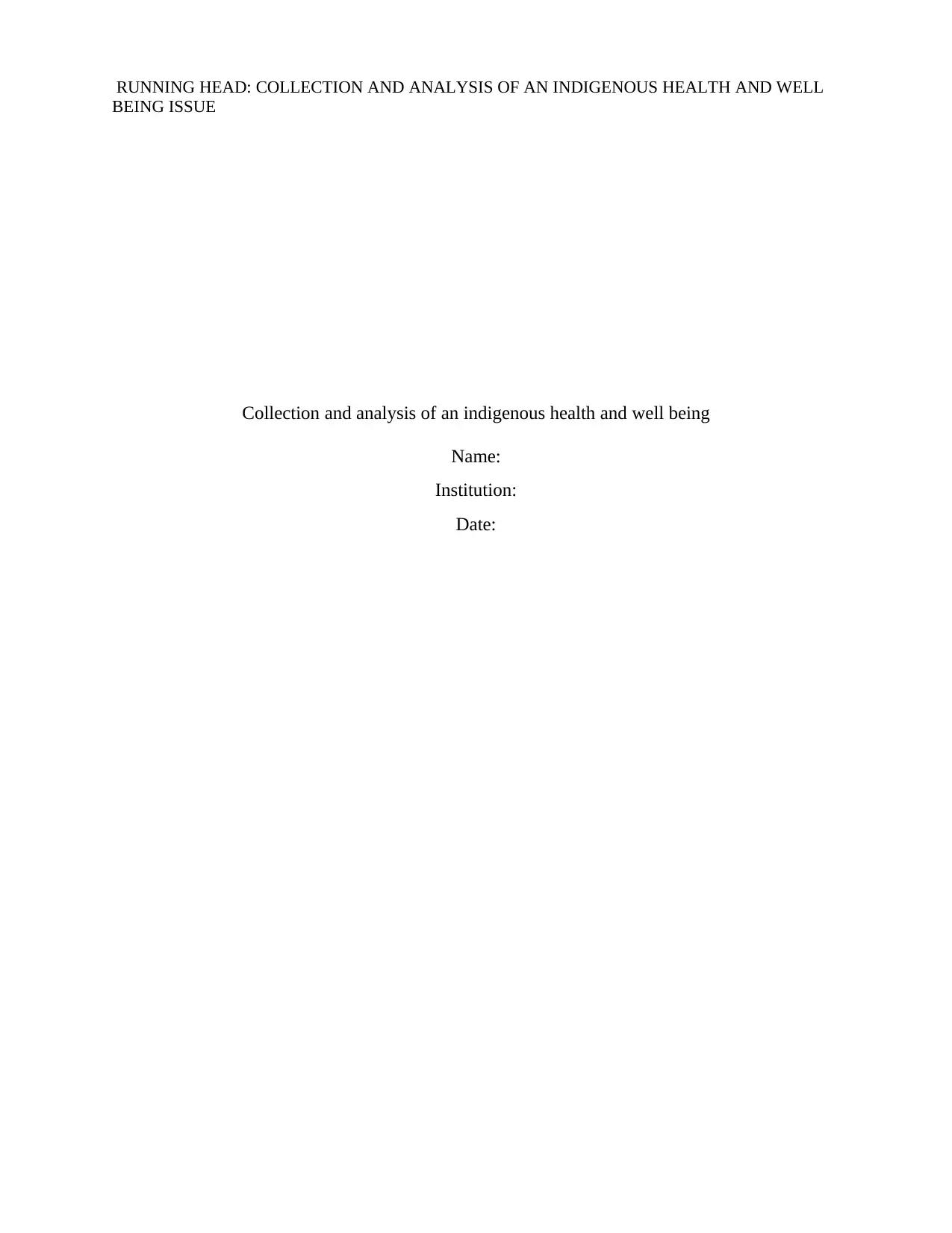
RUNNING HEAD: COLLECTION AND ANALYSIS OF AN INDIGENOUS HEALTH AND WELL
BEING ISSUE
Collection and analysis of an indigenous health and well being
Name:
Institution:
Date:
BEING ISSUE
Collection and analysis of an indigenous health and well being
Name:
Institution:
Date:
Paraphrase This Document
Need a fresh take? Get an instant paraphrase of this document with our AI Paraphraser
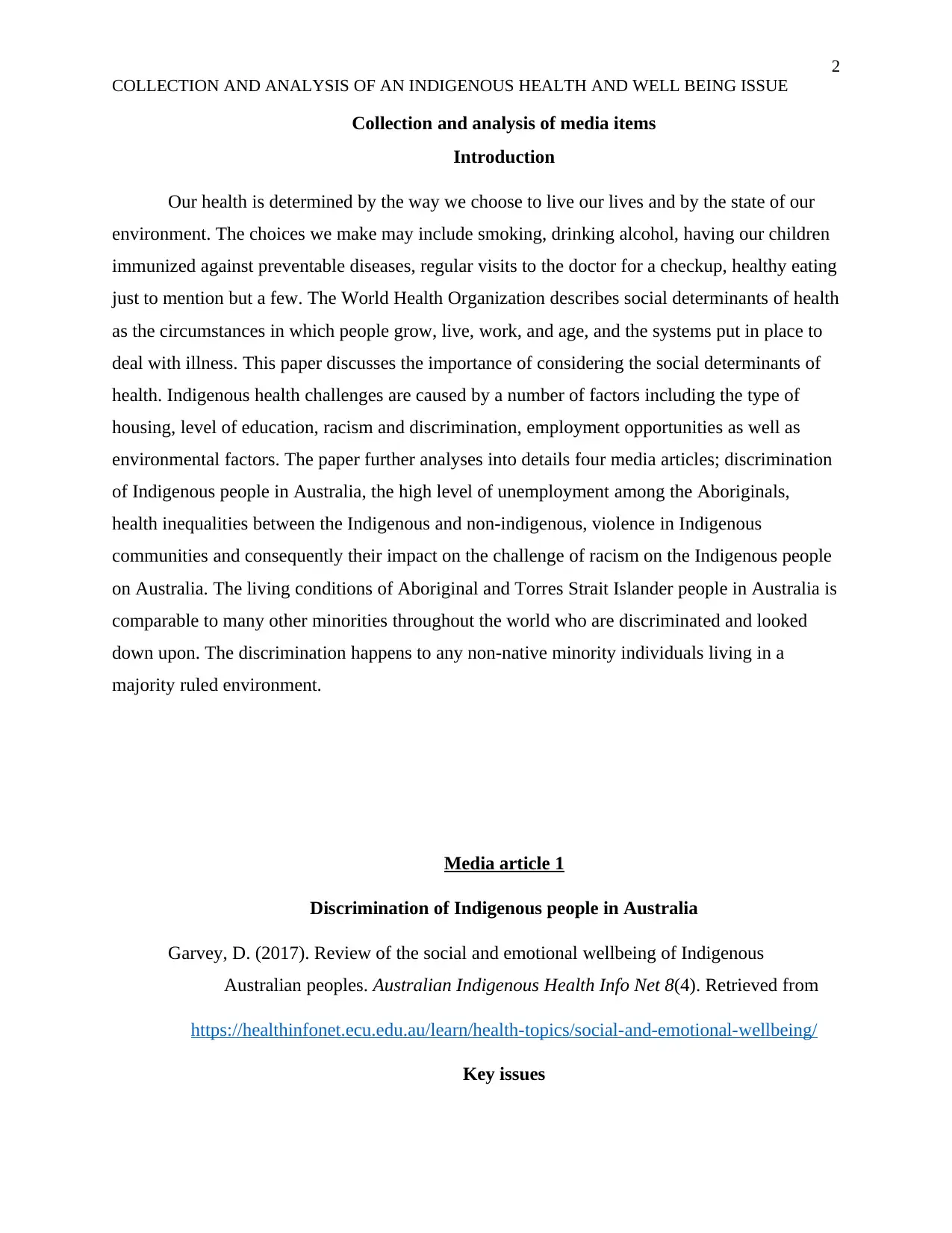
2
COLLECTION AND ANALYSIS OF AN INDIGENOUS HEALTH AND WELL BEING ISSUE
Collection and analysis of media items
Introduction
Our health is determined by the way we choose to live our lives and by the state of our
environment. The choices we make may include smoking, drinking alcohol, having our children
immunized against preventable diseases, regular visits to the doctor for a checkup, healthy eating
just to mention but a few. The World Health Organization describes social determinants of health
as the circumstances in which people grow, live, work, and age, and the systems put in place to
deal with illness. This paper discusses the importance of considering the social determinants of
health. Indigenous health challenges are caused by a number of factors including the type of
housing, level of education, racism and discrimination, employment opportunities as well as
environmental factors. The paper further analyses into details four media articles; discrimination
of Indigenous people in Australia, the high level of unemployment among the Aboriginals,
health inequalities between the Indigenous and non-indigenous, violence in Indigenous
communities and consequently their impact on the challenge of racism on the Indigenous people
on Australia. The living conditions of Aboriginal and Torres Strait Islander people in Australia is
comparable to many other minorities throughout the world who are discriminated and looked
down upon. The discrimination happens to any non-native minority individuals living in a
majority ruled environment.
Media article 1
Discrimination of Indigenous people in Australia
Garvey, D. (2017). Review of the social and emotional wellbeing of Indigenous
Australian peoples. Australian Indigenous Health Info Net 8(4). Retrieved from
https://healthinfonet.ecu.edu.au/learn/health-topics/social-and-emotional-wellbeing/
Key issues
COLLECTION AND ANALYSIS OF AN INDIGENOUS HEALTH AND WELL BEING ISSUE
Collection and analysis of media items
Introduction
Our health is determined by the way we choose to live our lives and by the state of our
environment. The choices we make may include smoking, drinking alcohol, having our children
immunized against preventable diseases, regular visits to the doctor for a checkup, healthy eating
just to mention but a few. The World Health Organization describes social determinants of health
as the circumstances in which people grow, live, work, and age, and the systems put in place to
deal with illness. This paper discusses the importance of considering the social determinants of
health. Indigenous health challenges are caused by a number of factors including the type of
housing, level of education, racism and discrimination, employment opportunities as well as
environmental factors. The paper further analyses into details four media articles; discrimination
of Indigenous people in Australia, the high level of unemployment among the Aboriginals,
health inequalities between the Indigenous and non-indigenous, violence in Indigenous
communities and consequently their impact on the challenge of racism on the Indigenous people
on Australia. The living conditions of Aboriginal and Torres Strait Islander people in Australia is
comparable to many other minorities throughout the world who are discriminated and looked
down upon. The discrimination happens to any non-native minority individuals living in a
majority ruled environment.
Media article 1
Discrimination of Indigenous people in Australia
Garvey, D. (2017). Review of the social and emotional wellbeing of Indigenous
Australian peoples. Australian Indigenous Health Info Net 8(4). Retrieved from
https://healthinfonet.ecu.edu.au/learn/health-topics/social-and-emotional-wellbeing/
Key issues
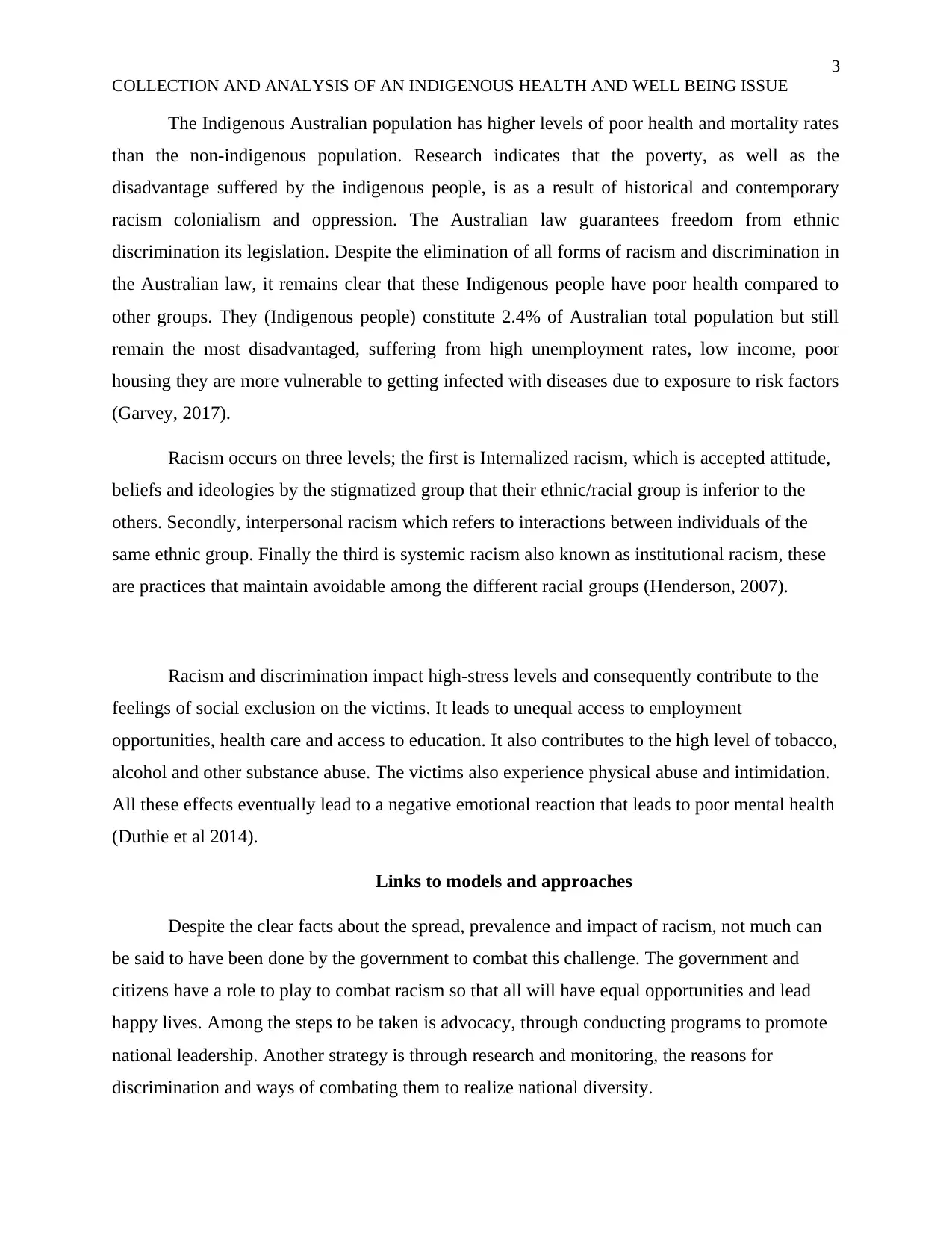
3
COLLECTION AND ANALYSIS OF AN INDIGENOUS HEALTH AND WELL BEING ISSUE
The Indigenous Australian population has higher levels of poor health and mortality rates
than the non-indigenous population. Research indicates that the poverty, as well as the
disadvantage suffered by the indigenous people, is as a result of historical and contemporary
racism colonialism and oppression. The Australian law guarantees freedom from ethnic
discrimination its legislation. Despite the elimination of all forms of racism and discrimination in
the Australian law, it remains clear that these Indigenous people have poor health compared to
other groups. They (Indigenous people) constitute 2.4% of Australian total population but still
remain the most disadvantaged, suffering from high unemployment rates, low income, poor
housing they are more vulnerable to getting infected with diseases due to exposure to risk factors
(Garvey, 2017).
Racism occurs on three levels; the first is Internalized racism, which is accepted attitude,
beliefs and ideologies by the stigmatized group that their ethnic/racial group is inferior to the
others. Secondly, interpersonal racism which refers to interactions between individuals of the
same ethnic group. Finally the third is systemic racism also known as institutional racism, these
are practices that maintain avoidable among the different racial groups (Henderson, 2007).
Racism and discrimination impact high-stress levels and consequently contribute to the
feelings of social exclusion on the victims. It leads to unequal access to employment
opportunities, health care and access to education. It also contributes to the high level of tobacco,
alcohol and other substance abuse. The victims also experience physical abuse and intimidation.
All these effects eventually lead to a negative emotional reaction that leads to poor mental health
(Duthie et al 2014).
Links to models and approaches
Despite the clear facts about the spread, prevalence and impact of racism, not much can
be said to have been done by the government to combat this challenge. The government and
citizens have a role to play to combat racism so that all will have equal opportunities and lead
happy lives. Among the steps to be taken is advocacy, through conducting programs to promote
national leadership. Another strategy is through research and monitoring, the reasons for
discrimination and ways of combating them to realize national diversity.
COLLECTION AND ANALYSIS OF AN INDIGENOUS HEALTH AND WELL BEING ISSUE
The Indigenous Australian population has higher levels of poor health and mortality rates
than the non-indigenous population. Research indicates that the poverty, as well as the
disadvantage suffered by the indigenous people, is as a result of historical and contemporary
racism colonialism and oppression. The Australian law guarantees freedom from ethnic
discrimination its legislation. Despite the elimination of all forms of racism and discrimination in
the Australian law, it remains clear that these Indigenous people have poor health compared to
other groups. They (Indigenous people) constitute 2.4% of Australian total population but still
remain the most disadvantaged, suffering from high unemployment rates, low income, poor
housing they are more vulnerable to getting infected with diseases due to exposure to risk factors
(Garvey, 2017).
Racism occurs on three levels; the first is Internalized racism, which is accepted attitude,
beliefs and ideologies by the stigmatized group that their ethnic/racial group is inferior to the
others. Secondly, interpersonal racism which refers to interactions between individuals of the
same ethnic group. Finally the third is systemic racism also known as institutional racism, these
are practices that maintain avoidable among the different racial groups (Henderson, 2007).
Racism and discrimination impact high-stress levels and consequently contribute to the
feelings of social exclusion on the victims. It leads to unequal access to employment
opportunities, health care and access to education. It also contributes to the high level of tobacco,
alcohol and other substance abuse. The victims also experience physical abuse and intimidation.
All these effects eventually lead to a negative emotional reaction that leads to poor mental health
(Duthie et al 2014).
Links to models and approaches
Despite the clear facts about the spread, prevalence and impact of racism, not much can
be said to have been done by the government to combat this challenge. The government and
citizens have a role to play to combat racism so that all will have equal opportunities and lead
happy lives. Among the steps to be taken is advocacy, through conducting programs to promote
national leadership. Another strategy is through research and monitoring, the reasons for
discrimination and ways of combating them to realize national diversity.
⊘ This is a preview!⊘
Do you want full access?
Subscribe today to unlock all pages.

Trusted by 1+ million students worldwide
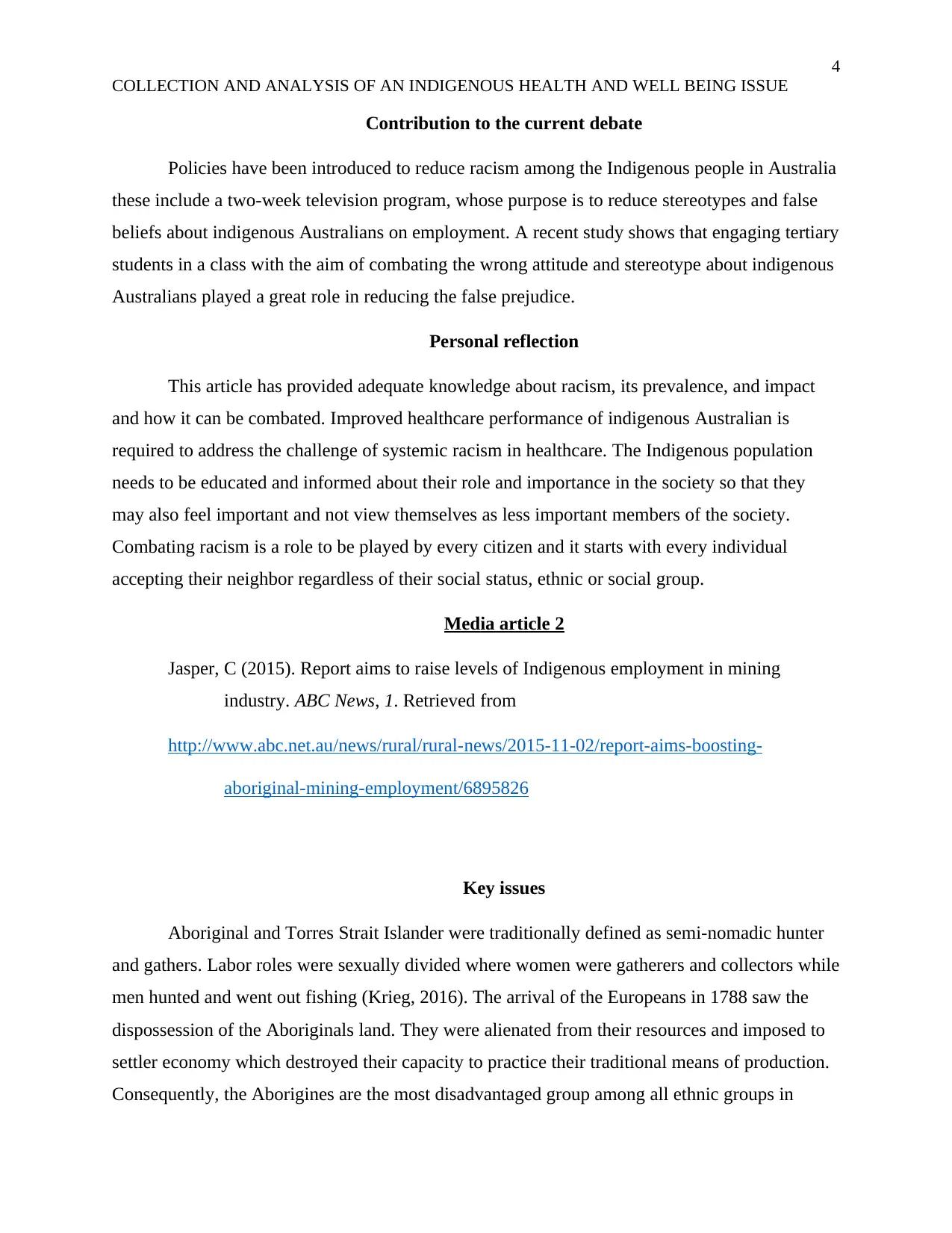
4
COLLECTION AND ANALYSIS OF AN INDIGENOUS HEALTH AND WELL BEING ISSUE
Contribution to the current debate
Policies have been introduced to reduce racism among the Indigenous people in Australia
these include a two-week television program, whose purpose is to reduce stereotypes and false
beliefs about indigenous Australians on employment. A recent study shows that engaging tertiary
students in a class with the aim of combating the wrong attitude and stereotype about indigenous
Australians played a great role in reducing the false prejudice.
Personal reflection
This article has provided adequate knowledge about racism, its prevalence, and impact
and how it can be combated. Improved healthcare performance of indigenous Australian is
required to address the challenge of systemic racism in healthcare. The Indigenous population
needs to be educated and informed about their role and importance in the society so that they
may also feel important and not view themselves as less important members of the society.
Combating racism is a role to be played by every citizen and it starts with every individual
accepting their neighbor regardless of their social status, ethnic or social group.
Media article 2
Jasper, C (2015). Report aims to raise levels of Indigenous employment in mining
industry. ABC News, 1. Retrieved from
http://www.abc.net.au/news/rural/rural-news/2015-11-02/report-aims-boosting-
aboriginal-mining-employment/6895826
Key issues
Aboriginal and Torres Strait Islander were traditionally defined as semi-nomadic hunter
and gathers. Labor roles were sexually divided where women were gatherers and collectors while
men hunted and went out fishing (Krieg, 2016). The arrival of the Europeans in 1788 saw the
dispossession of the Aboriginals land. They were alienated from their resources and imposed to
settler economy which destroyed their capacity to practice their traditional means of production.
Consequently, the Aborigines are the most disadvantaged group among all ethnic groups in
COLLECTION AND ANALYSIS OF AN INDIGENOUS HEALTH AND WELL BEING ISSUE
Contribution to the current debate
Policies have been introduced to reduce racism among the Indigenous people in Australia
these include a two-week television program, whose purpose is to reduce stereotypes and false
beliefs about indigenous Australians on employment. A recent study shows that engaging tertiary
students in a class with the aim of combating the wrong attitude and stereotype about indigenous
Australians played a great role in reducing the false prejudice.
Personal reflection
This article has provided adequate knowledge about racism, its prevalence, and impact
and how it can be combated. Improved healthcare performance of indigenous Australian is
required to address the challenge of systemic racism in healthcare. The Indigenous population
needs to be educated and informed about their role and importance in the society so that they
may also feel important and not view themselves as less important members of the society.
Combating racism is a role to be played by every citizen and it starts with every individual
accepting their neighbor regardless of their social status, ethnic or social group.
Media article 2
Jasper, C (2015). Report aims to raise levels of Indigenous employment in mining
industry. ABC News, 1. Retrieved from
http://www.abc.net.au/news/rural/rural-news/2015-11-02/report-aims-boosting-
aboriginal-mining-employment/6895826
Key issues
Aboriginal and Torres Strait Islander were traditionally defined as semi-nomadic hunter
and gathers. Labor roles were sexually divided where women were gatherers and collectors while
men hunted and went out fishing (Krieg, 2016). The arrival of the Europeans in 1788 saw the
dispossession of the Aboriginals land. They were alienated from their resources and imposed to
settler economy which destroyed their capacity to practice their traditional means of production.
Consequently, the Aborigines are the most disadvantaged group among all ethnic groups in
Paraphrase This Document
Need a fresh take? Get an instant paraphrase of this document with our AI Paraphraser
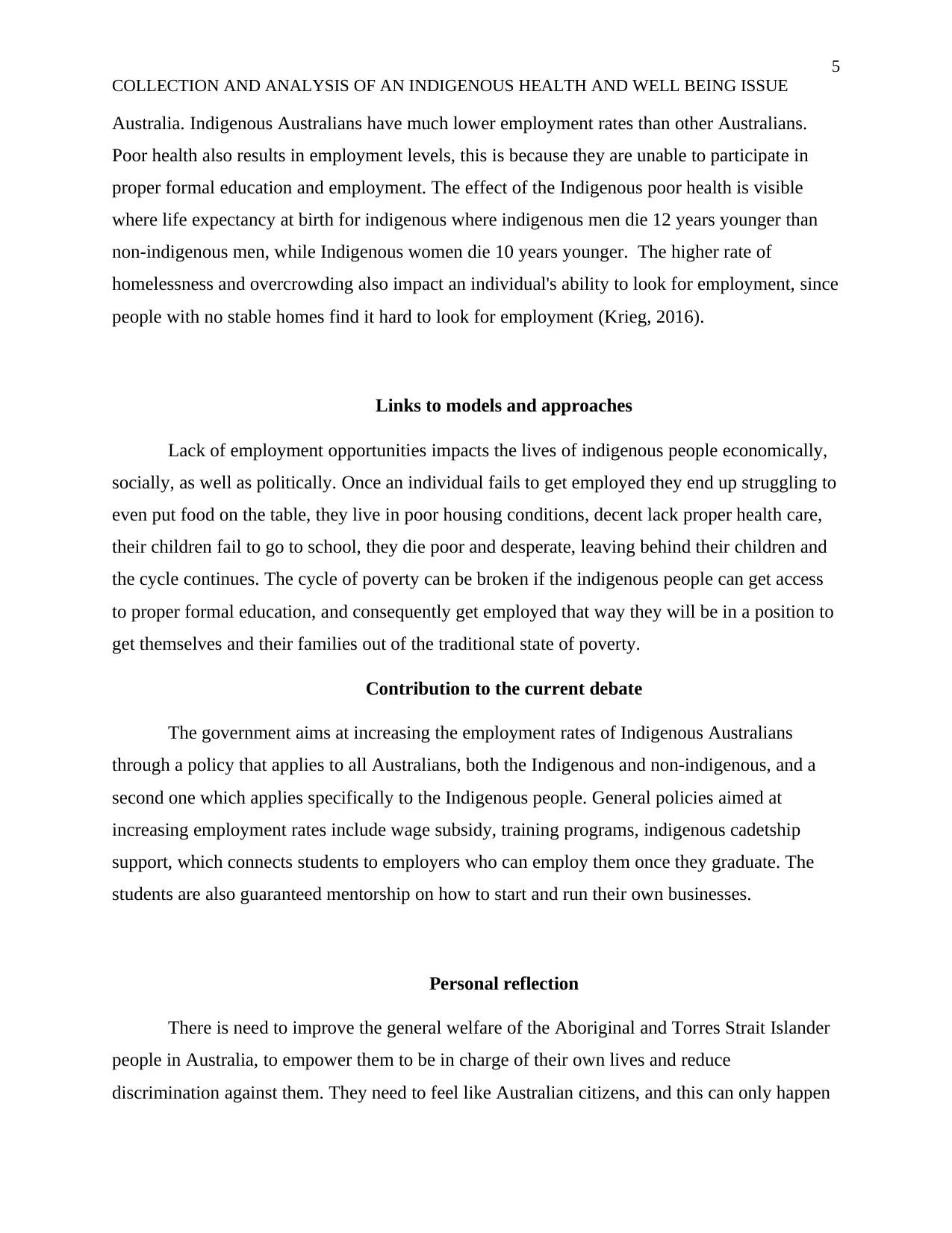
5
COLLECTION AND ANALYSIS OF AN INDIGENOUS HEALTH AND WELL BEING ISSUE
Australia. Indigenous Australians have much lower employment rates than other Australians.
Poor health also results in employment levels, this is because they are unable to participate in
proper formal education and employment. The effect of the Indigenous poor health is visible
where life expectancy at birth for indigenous where indigenous men die 12 years younger than
non-indigenous men, while Indigenous women die 10 years younger. The higher rate of
homelessness and overcrowding also impact an individual's ability to look for employment, since
people with no stable homes find it hard to look for employment (Krieg, 2016).
Links to models and approaches
Lack of employment opportunities impacts the lives of indigenous people economically,
socially, as well as politically. Once an individual fails to get employed they end up struggling to
even put food on the table, they live in poor housing conditions, decent lack proper health care,
their children fail to go to school, they die poor and desperate, leaving behind their children and
the cycle continues. The cycle of poverty can be broken if the indigenous people can get access
to proper formal education, and consequently get employed that way they will be in a position to
get themselves and their families out of the traditional state of poverty.
Contribution to the current debate
The government aims at increasing the employment rates of Indigenous Australians
through a policy that applies to all Australians, both the Indigenous and non-indigenous, and a
second one which applies specifically to the Indigenous people. General policies aimed at
increasing employment rates include wage subsidy, training programs, indigenous cadetship
support, which connects students to employers who can employ them once they graduate. The
students are also guaranteed mentorship on how to start and run their own businesses.
Personal reflection
There is need to improve the general welfare of the Aboriginal and Torres Strait Islander
people in Australia, to empower them to be in charge of their own lives and reduce
discrimination against them. They need to feel like Australian citizens, and this can only happen
COLLECTION AND ANALYSIS OF AN INDIGENOUS HEALTH AND WELL BEING ISSUE
Australia. Indigenous Australians have much lower employment rates than other Australians.
Poor health also results in employment levels, this is because they are unable to participate in
proper formal education and employment. The effect of the Indigenous poor health is visible
where life expectancy at birth for indigenous where indigenous men die 12 years younger than
non-indigenous men, while Indigenous women die 10 years younger. The higher rate of
homelessness and overcrowding also impact an individual's ability to look for employment, since
people with no stable homes find it hard to look for employment (Krieg, 2016).
Links to models and approaches
Lack of employment opportunities impacts the lives of indigenous people economically,
socially, as well as politically. Once an individual fails to get employed they end up struggling to
even put food on the table, they live in poor housing conditions, decent lack proper health care,
their children fail to go to school, they die poor and desperate, leaving behind their children and
the cycle continues. The cycle of poverty can be broken if the indigenous people can get access
to proper formal education, and consequently get employed that way they will be in a position to
get themselves and their families out of the traditional state of poverty.
Contribution to the current debate
The government aims at increasing the employment rates of Indigenous Australians
through a policy that applies to all Australians, both the Indigenous and non-indigenous, and a
second one which applies specifically to the Indigenous people. General policies aimed at
increasing employment rates include wage subsidy, training programs, indigenous cadetship
support, which connects students to employers who can employ them once they graduate. The
students are also guaranteed mentorship on how to start and run their own businesses.
Personal reflection
There is need to improve the general welfare of the Aboriginal and Torres Strait Islander
people in Australia, to empower them to be in charge of their own lives and reduce
discrimination against them. They need to feel like Australian citizens, and this can only happen
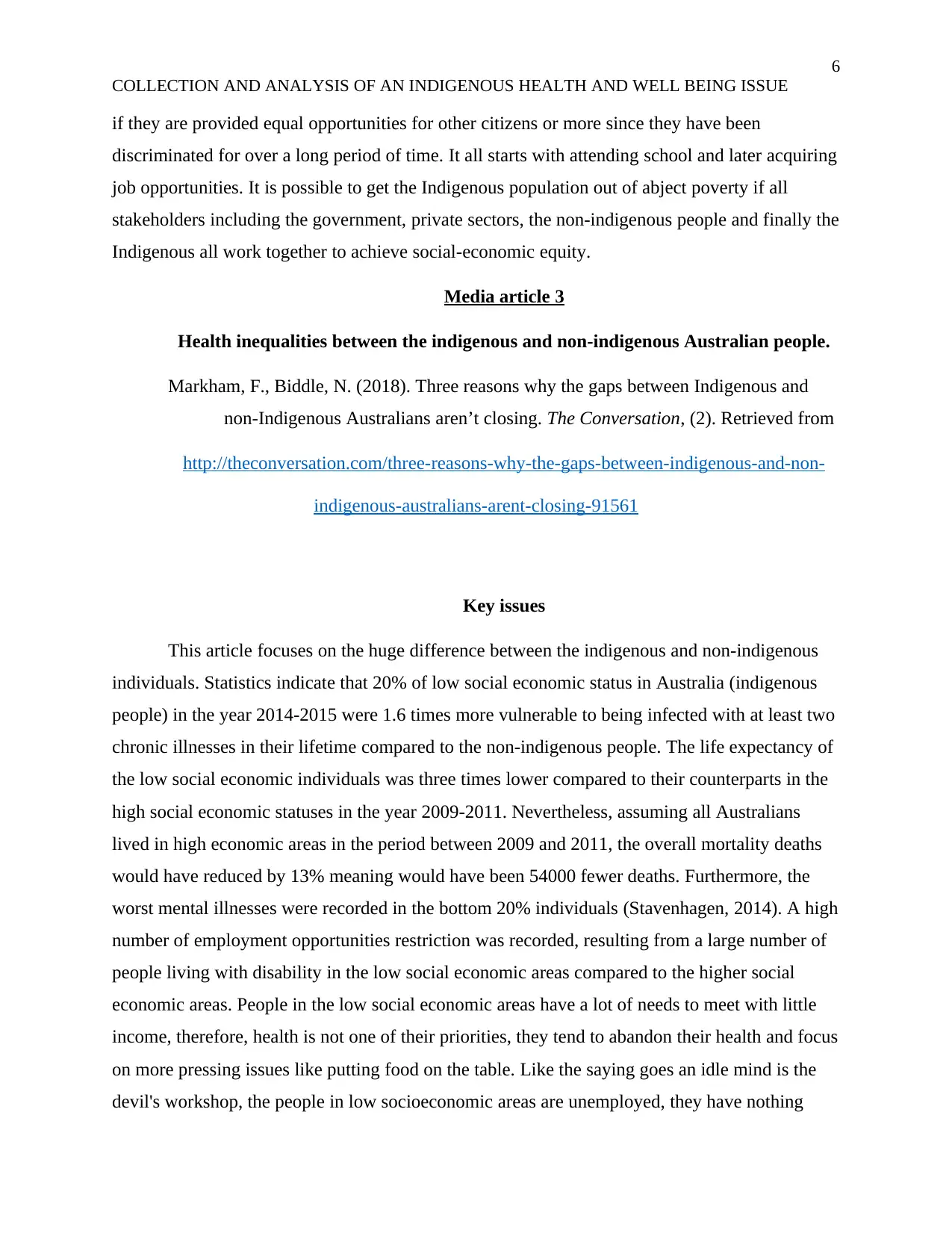
6
COLLECTION AND ANALYSIS OF AN INDIGENOUS HEALTH AND WELL BEING ISSUE
if they are provided equal opportunities for other citizens or more since they have been
discriminated for over a long period of time. It all starts with attending school and later acquiring
job opportunities. It is possible to get the Indigenous population out of abject poverty if all
stakeholders including the government, private sectors, the non-indigenous people and finally the
Indigenous all work together to achieve social-economic equity.
Media article 3
Health inequalities between the indigenous and non-indigenous Australian people.
Markham, F., Biddle, N. (2018). Three reasons why the gaps between Indigenous and
non-Indigenous Australians aren’t closing. The Conversation, (2). Retrieved from
http://theconversation.com/three-reasons-why-the-gaps-between-indigenous-and-non-
indigenous-australians-arent-closing-91561
Key issues
This article focuses on the huge difference between the indigenous and non-indigenous
individuals. Statistics indicate that 20% of low social economic status in Australia (indigenous
people) in the year 2014-2015 were 1.6 times more vulnerable to being infected with at least two
chronic illnesses in their lifetime compared to the non-indigenous people. The life expectancy of
the low social economic individuals was three times lower compared to their counterparts in the
high social economic statuses in the year 2009-2011. Nevertheless, assuming all Australians
lived in high economic areas in the period between 2009 and 2011, the overall mortality deaths
would have reduced by 13% meaning would have been 54000 fewer deaths. Furthermore, the
worst mental illnesses were recorded in the bottom 20% individuals (Stavenhagen, 2014). A high
number of employment opportunities restriction was recorded, resulting from a large number of
people living with disability in the low social economic areas compared to the higher social
economic areas. People in the low social economic areas have a lot of needs to meet with little
income, therefore, health is not one of their priorities, they tend to abandon their health and focus
on more pressing issues like putting food on the table. Like the saying goes an idle mind is the
devil's workshop, the people in low socioeconomic areas are unemployed, they have nothing
COLLECTION AND ANALYSIS OF AN INDIGENOUS HEALTH AND WELL BEING ISSUE
if they are provided equal opportunities for other citizens or more since they have been
discriminated for over a long period of time. It all starts with attending school and later acquiring
job opportunities. It is possible to get the Indigenous population out of abject poverty if all
stakeholders including the government, private sectors, the non-indigenous people and finally the
Indigenous all work together to achieve social-economic equity.
Media article 3
Health inequalities between the indigenous and non-indigenous Australian people.
Markham, F., Biddle, N. (2018). Three reasons why the gaps between Indigenous and
non-Indigenous Australians aren’t closing. The Conversation, (2). Retrieved from
http://theconversation.com/three-reasons-why-the-gaps-between-indigenous-and-non-
indigenous-australians-arent-closing-91561
Key issues
This article focuses on the huge difference between the indigenous and non-indigenous
individuals. Statistics indicate that 20% of low social economic status in Australia (indigenous
people) in the year 2014-2015 were 1.6 times more vulnerable to being infected with at least two
chronic illnesses in their lifetime compared to the non-indigenous people. The life expectancy of
the low social economic individuals was three times lower compared to their counterparts in the
high social economic statuses in the year 2009-2011. Nevertheless, assuming all Australians
lived in high economic areas in the period between 2009 and 2011, the overall mortality deaths
would have reduced by 13% meaning would have been 54000 fewer deaths. Furthermore, the
worst mental illnesses were recorded in the bottom 20% individuals (Stavenhagen, 2014). A high
number of employment opportunities restriction was recorded, resulting from a large number of
people living with disability in the low social economic areas compared to the higher social
economic areas. People in the low social economic areas have a lot of needs to meet with little
income, therefore, health is not one of their priorities, they tend to abandon their health and focus
on more pressing issues like putting food on the table. Like the saying goes an idle mind is the
devil's workshop, the people in low socioeconomic areas are unemployed, they have nothing
⊘ This is a preview!⊘
Do you want full access?
Subscribe today to unlock all pages.

Trusted by 1+ million students worldwide
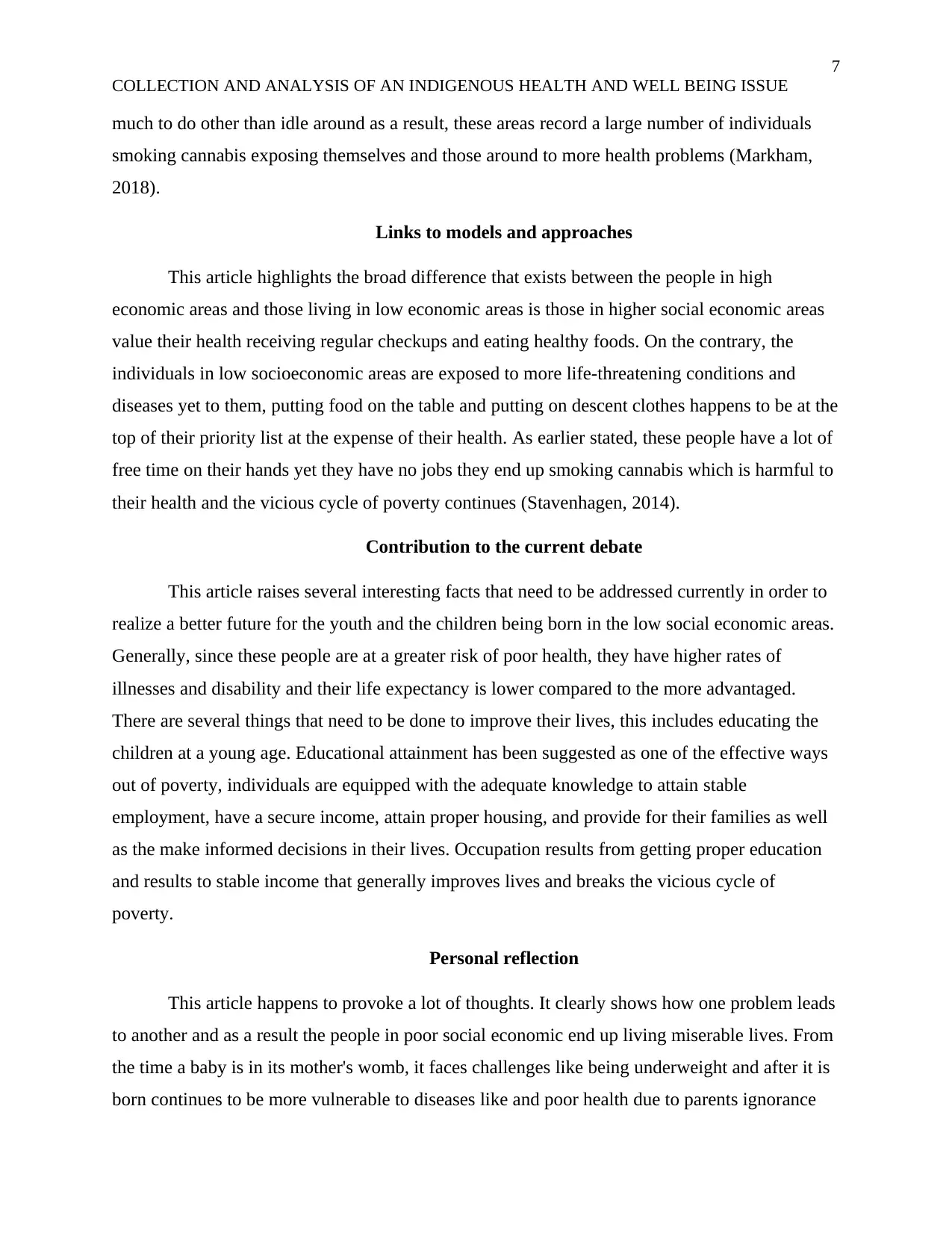
7
COLLECTION AND ANALYSIS OF AN INDIGENOUS HEALTH AND WELL BEING ISSUE
much to do other than idle around as a result, these areas record a large number of individuals
smoking cannabis exposing themselves and those around to more health problems (Markham,
2018).
Links to models and approaches
This article highlights the broad difference that exists between the people in high
economic areas and those living in low economic areas is those in higher social economic areas
value their health receiving regular checkups and eating healthy foods. On the contrary, the
individuals in low socioeconomic areas are exposed to more life-threatening conditions and
diseases yet to them, putting food on the table and putting on descent clothes happens to be at the
top of their priority list at the expense of their health. As earlier stated, these people have a lot of
free time on their hands yet they have no jobs they end up smoking cannabis which is harmful to
their health and the vicious cycle of poverty continues (Stavenhagen, 2014).
Contribution to the current debate
This article raises several interesting facts that need to be addressed currently in order to
realize a better future for the youth and the children being born in the low social economic areas.
Generally, since these people are at a greater risk of poor health, they have higher rates of
illnesses and disability and their life expectancy is lower compared to the more advantaged.
There are several things that need to be done to improve their lives, this includes educating the
children at a young age. Educational attainment has been suggested as one of the effective ways
out of poverty, individuals are equipped with the adequate knowledge to attain stable
employment, have a secure income, attain proper housing, and provide for their families as well
as the make informed decisions in their lives. Occupation results from getting proper education
and results to stable income that generally improves lives and breaks the vicious cycle of
poverty.
Personal reflection
This article happens to provoke a lot of thoughts. It clearly shows how one problem leads
to another and as a result the people in poor social economic end up living miserable lives. From
the time a baby is in its mother's womb, it faces challenges like being underweight and after it is
born continues to be more vulnerable to diseases like and poor health due to parents ignorance
COLLECTION AND ANALYSIS OF AN INDIGENOUS HEALTH AND WELL BEING ISSUE
much to do other than idle around as a result, these areas record a large number of individuals
smoking cannabis exposing themselves and those around to more health problems (Markham,
2018).
Links to models and approaches
This article highlights the broad difference that exists between the people in high
economic areas and those living in low economic areas is those in higher social economic areas
value their health receiving regular checkups and eating healthy foods. On the contrary, the
individuals in low socioeconomic areas are exposed to more life-threatening conditions and
diseases yet to them, putting food on the table and putting on descent clothes happens to be at the
top of their priority list at the expense of their health. As earlier stated, these people have a lot of
free time on their hands yet they have no jobs they end up smoking cannabis which is harmful to
their health and the vicious cycle of poverty continues (Stavenhagen, 2014).
Contribution to the current debate
This article raises several interesting facts that need to be addressed currently in order to
realize a better future for the youth and the children being born in the low social economic areas.
Generally, since these people are at a greater risk of poor health, they have higher rates of
illnesses and disability and their life expectancy is lower compared to the more advantaged.
There are several things that need to be done to improve their lives, this includes educating the
children at a young age. Educational attainment has been suggested as one of the effective ways
out of poverty, individuals are equipped with the adequate knowledge to attain stable
employment, have a secure income, attain proper housing, and provide for their families as well
as the make informed decisions in their lives. Occupation results from getting proper education
and results to stable income that generally improves lives and breaks the vicious cycle of
poverty.
Personal reflection
This article happens to provoke a lot of thoughts. It clearly shows how one problem leads
to another and as a result the people in poor social economic end up living miserable lives. From
the time a baby is in its mother's womb, it faces challenges like being underweight and after it is
born continues to be more vulnerable to diseases like and poor health due to parents ignorance
Paraphrase This Document
Need a fresh take? Get an instant paraphrase of this document with our AI Paraphraser
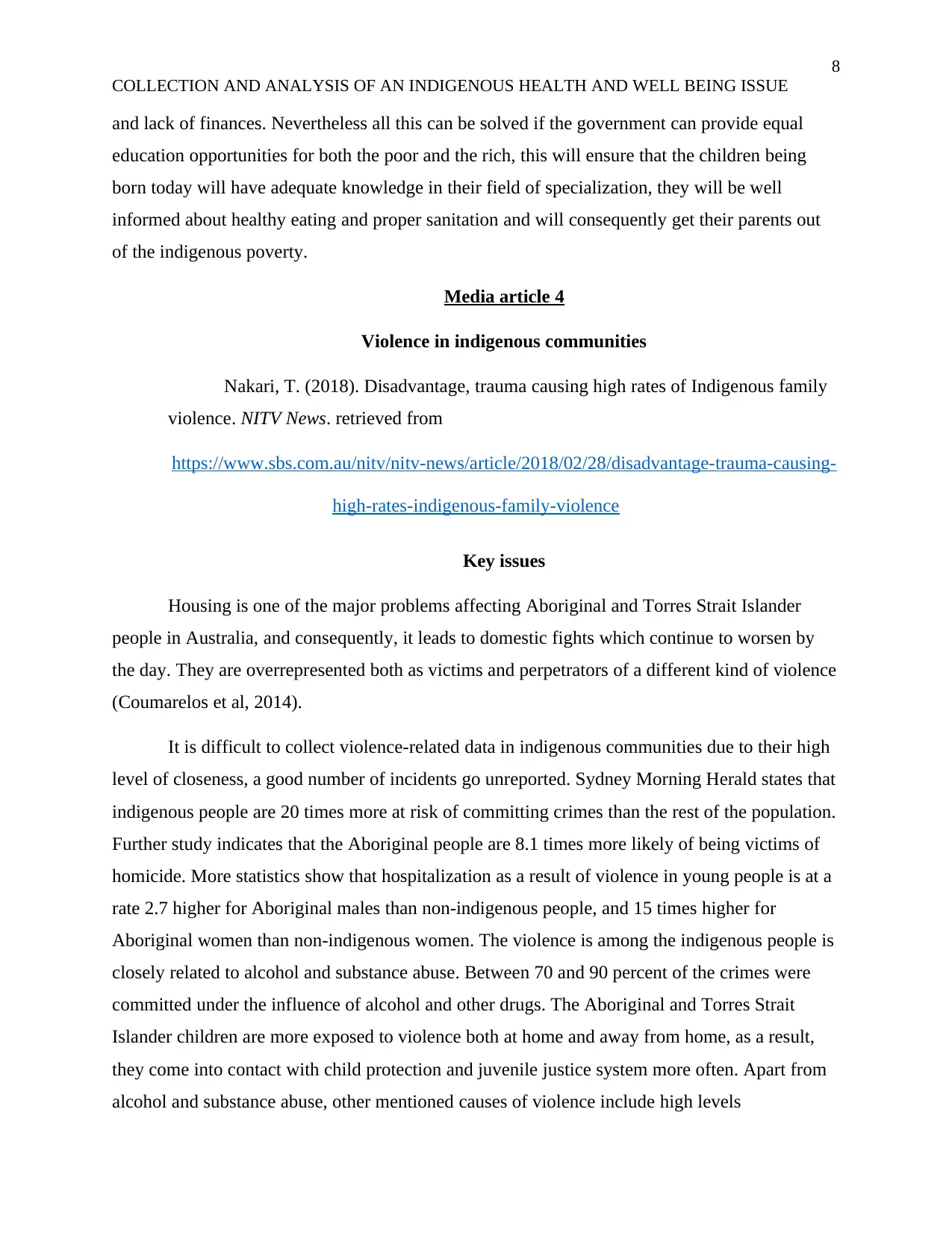
8
COLLECTION AND ANALYSIS OF AN INDIGENOUS HEALTH AND WELL BEING ISSUE
and lack of finances. Nevertheless all this can be solved if the government can provide equal
education opportunities for both the poor and the rich, this will ensure that the children being
born today will have adequate knowledge in their field of specialization, they will be well
informed about healthy eating and proper sanitation and will consequently get their parents out
of the indigenous poverty.
Media article 4
Violence in indigenous communities
Nakari, T. (2018). Disadvantage, trauma causing high rates of Indigenous family
violence. NITV News. retrieved from
https://www.sbs.com.au/nitv/nitv-news/article/2018/02/28/disadvantage-trauma-causing-
high-rates-indigenous-family-violence
Key issues
Housing is one of the major problems affecting Aboriginal and Torres Strait Islander
people in Australia, and consequently, it leads to domestic fights which continue to worsen by
the day. They are overrepresented both as victims and perpetrators of a different kind of violence
(Coumarelos et al, 2014).
It is difficult to collect violence-related data in indigenous communities due to their high
level of closeness, a good number of incidents go unreported. Sydney Morning Herald states that
indigenous people are 20 times more at risk of committing crimes than the rest of the population.
Further study indicates that the Aboriginal people are 8.1 times more likely of being victims of
homicide. More statistics show that hospitalization as a result of violence in young people is at a
rate 2.7 higher for Aboriginal males than non-indigenous people, and 15 times higher for
Aboriginal women than non-indigenous women. The violence is among the indigenous people is
closely related to alcohol and substance abuse. Between 70 and 90 percent of the crimes were
committed under the influence of alcohol and other drugs. The Aboriginal and Torres Strait
Islander children are more exposed to violence both at home and away from home, as a result,
they come into contact with child protection and juvenile justice system more often. Apart from
alcohol and substance abuse, other mentioned causes of violence include high levels
COLLECTION AND ANALYSIS OF AN INDIGENOUS HEALTH AND WELL BEING ISSUE
and lack of finances. Nevertheless all this can be solved if the government can provide equal
education opportunities for both the poor and the rich, this will ensure that the children being
born today will have adequate knowledge in their field of specialization, they will be well
informed about healthy eating and proper sanitation and will consequently get their parents out
of the indigenous poverty.
Media article 4
Violence in indigenous communities
Nakari, T. (2018). Disadvantage, trauma causing high rates of Indigenous family
violence. NITV News. retrieved from
https://www.sbs.com.au/nitv/nitv-news/article/2018/02/28/disadvantage-trauma-causing-
high-rates-indigenous-family-violence
Key issues
Housing is one of the major problems affecting Aboriginal and Torres Strait Islander
people in Australia, and consequently, it leads to domestic fights which continue to worsen by
the day. They are overrepresented both as victims and perpetrators of a different kind of violence
(Coumarelos et al, 2014).
It is difficult to collect violence-related data in indigenous communities due to their high
level of closeness, a good number of incidents go unreported. Sydney Morning Herald states that
indigenous people are 20 times more at risk of committing crimes than the rest of the population.
Further study indicates that the Aboriginal people are 8.1 times more likely of being victims of
homicide. More statistics show that hospitalization as a result of violence in young people is at a
rate 2.7 higher for Aboriginal males than non-indigenous people, and 15 times higher for
Aboriginal women than non-indigenous women. The violence is among the indigenous people is
closely related to alcohol and substance abuse. Between 70 and 90 percent of the crimes were
committed under the influence of alcohol and other drugs. The Aboriginal and Torres Strait
Islander children are more exposed to violence both at home and away from home, as a result,
they come into contact with child protection and juvenile justice system more often. Apart from
alcohol and substance abuse, other mentioned causes of violence include high levels
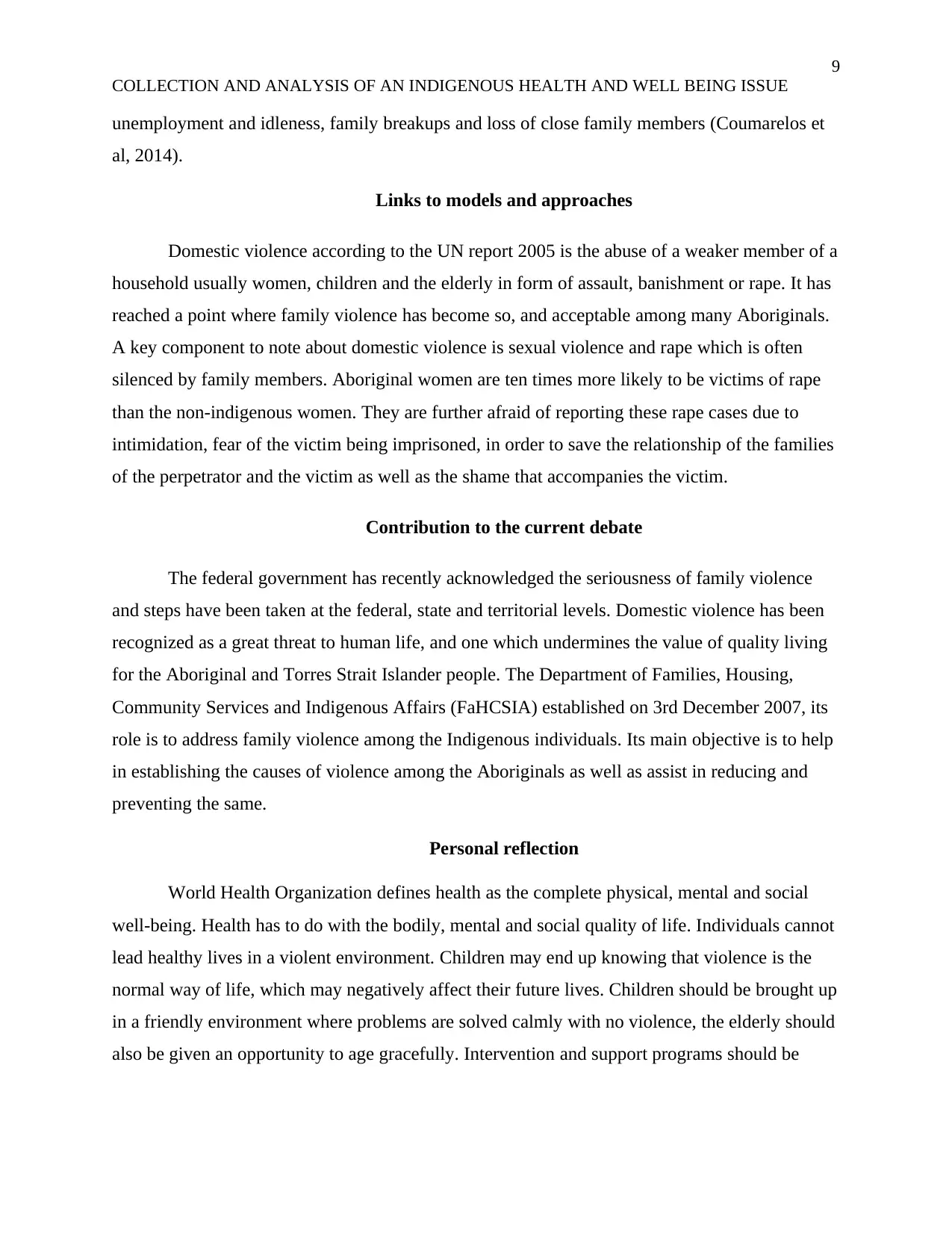
9
COLLECTION AND ANALYSIS OF AN INDIGENOUS HEALTH AND WELL BEING ISSUE
unemployment and idleness, family breakups and loss of close family members (Coumarelos et
al, 2014).
Links to models and approaches
Domestic violence according to the UN report 2005 is the abuse of a weaker member of a
household usually women, children and the elderly in form of assault, banishment or rape. It has
reached a point where family violence has become so, and acceptable among many Aboriginals.
A key component to note about domestic violence is sexual violence and rape which is often
silenced by family members. Aboriginal women are ten times more likely to be victims of rape
than the non-indigenous women. They are further afraid of reporting these rape cases due to
intimidation, fear of the victim being imprisoned, in order to save the relationship of the families
of the perpetrator and the victim as well as the shame that accompanies the victim.
Contribution to the current debate
The federal government has recently acknowledged the seriousness of family violence
and steps have been taken at the federal, state and territorial levels. Domestic violence has been
recognized as a great threat to human life, and one which undermines the value of quality living
for the Aboriginal and Torres Strait Islander people. The Department of Families, Housing,
Community Services and Indigenous Affairs (FaHCSIA) established on 3rd December 2007, its
role is to address family violence among the Indigenous individuals. Its main objective is to help
in establishing the causes of violence among the Aboriginals as well as assist in reducing and
preventing the same.
Personal reflection
World Health Organization defines health as the complete physical, mental and social
well-being. Health has to do with the bodily, mental and social quality of life. Individuals cannot
lead healthy lives in a violent environment. Children may end up knowing that violence is the
normal way of life, which may negatively affect their future lives. Children should be brought up
in a friendly environment where problems are solved calmly with no violence, the elderly should
also be given an opportunity to age gracefully. Intervention and support programs should be
COLLECTION AND ANALYSIS OF AN INDIGENOUS HEALTH AND WELL BEING ISSUE
unemployment and idleness, family breakups and loss of close family members (Coumarelos et
al, 2014).
Links to models and approaches
Domestic violence according to the UN report 2005 is the abuse of a weaker member of a
household usually women, children and the elderly in form of assault, banishment or rape. It has
reached a point where family violence has become so, and acceptable among many Aboriginals.
A key component to note about domestic violence is sexual violence and rape which is often
silenced by family members. Aboriginal women are ten times more likely to be victims of rape
than the non-indigenous women. They are further afraid of reporting these rape cases due to
intimidation, fear of the victim being imprisoned, in order to save the relationship of the families
of the perpetrator and the victim as well as the shame that accompanies the victim.
Contribution to the current debate
The federal government has recently acknowledged the seriousness of family violence
and steps have been taken at the federal, state and territorial levels. Domestic violence has been
recognized as a great threat to human life, and one which undermines the value of quality living
for the Aboriginal and Torres Strait Islander people. The Department of Families, Housing,
Community Services and Indigenous Affairs (FaHCSIA) established on 3rd December 2007, its
role is to address family violence among the Indigenous individuals. Its main objective is to help
in establishing the causes of violence among the Aboriginals as well as assist in reducing and
preventing the same.
Personal reflection
World Health Organization defines health as the complete physical, mental and social
well-being. Health has to do with the bodily, mental and social quality of life. Individuals cannot
lead healthy lives in a violent environment. Children may end up knowing that violence is the
normal way of life, which may negatively affect their future lives. Children should be brought up
in a friendly environment where problems are solved calmly with no violence, the elderly should
also be given an opportunity to age gracefully. Intervention and support programs should be
⊘ This is a preview!⊘
Do you want full access?
Subscribe today to unlock all pages.

Trusted by 1+ million students worldwide
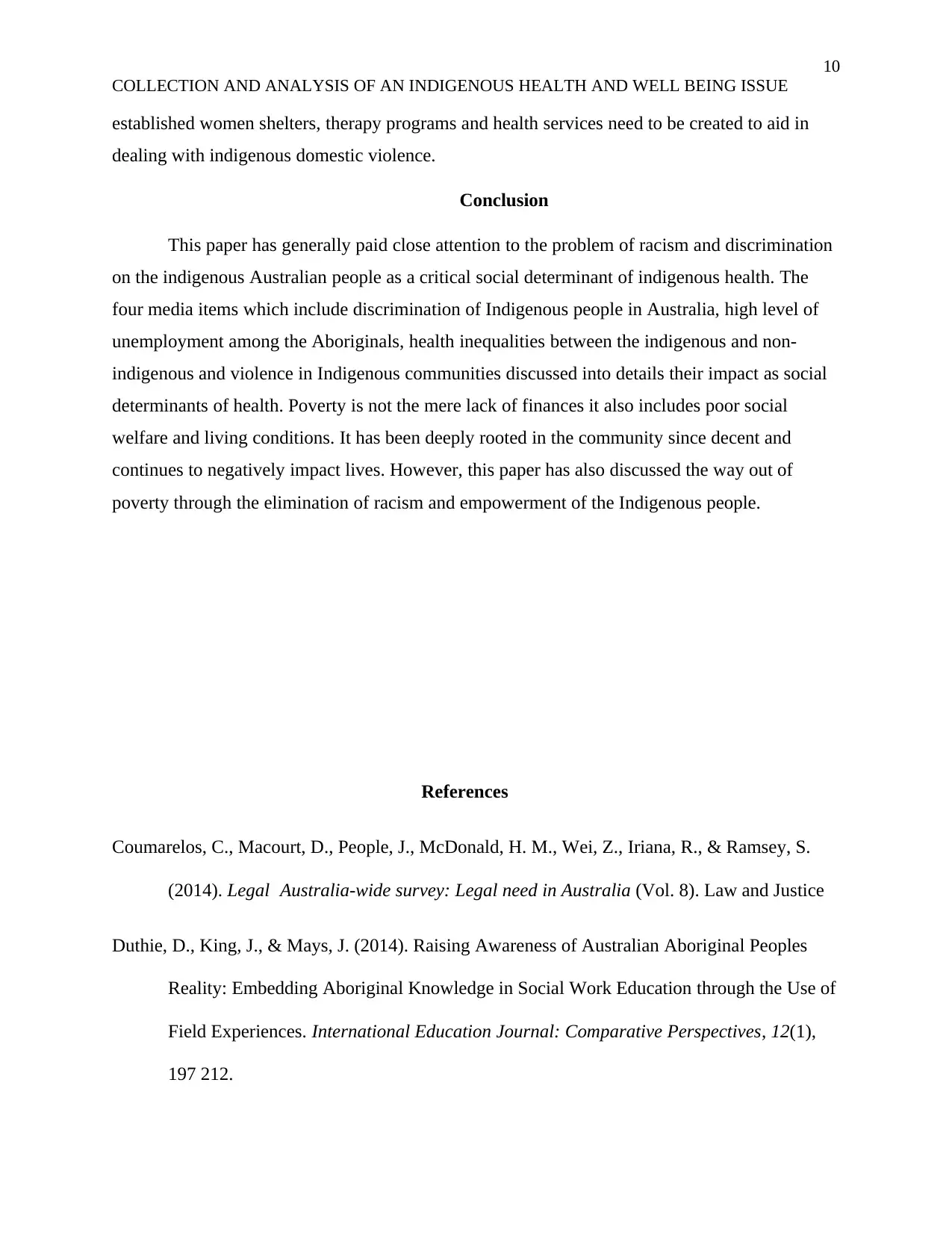
10
COLLECTION AND ANALYSIS OF AN INDIGENOUS HEALTH AND WELL BEING ISSUE
established women shelters, therapy programs and health services need to be created to aid in
dealing with indigenous domestic violence.
Conclusion
This paper has generally paid close attention to the problem of racism and discrimination
on the indigenous Australian people as a critical social determinant of indigenous health. The
four media items which include discrimination of Indigenous people in Australia, high level of
unemployment among the Aboriginals, health inequalities between the indigenous and non-
indigenous and violence in Indigenous communities discussed into details their impact as social
determinants of health. Poverty is not the mere lack of finances it also includes poor social
welfare and living conditions. It has been deeply rooted in the community since decent and
continues to negatively impact lives. However, this paper has also discussed the way out of
poverty through the elimination of racism and empowerment of the Indigenous people.
References
Coumarelos, C., Macourt, D., People, J., McDonald, H. M., Wei, Z., Iriana, R., & Ramsey, S.
(2014). Legal Australia-wide survey: Legal need in Australia (Vol. 8). Law and Justice
Duthie, D., King, J., & Mays, J. (2014). Raising Awareness of Australian Aboriginal Peoples
Reality: Embedding Aboriginal Knowledge in Social Work Education through the Use of
Field Experiences. International Education Journal: Comparative Perspectives, 12(1),
197 212.
COLLECTION AND ANALYSIS OF AN INDIGENOUS HEALTH AND WELL BEING ISSUE
established women shelters, therapy programs and health services need to be created to aid in
dealing with indigenous domestic violence.
Conclusion
This paper has generally paid close attention to the problem of racism and discrimination
on the indigenous Australian people as a critical social determinant of indigenous health. The
four media items which include discrimination of Indigenous people in Australia, high level of
unemployment among the Aboriginals, health inequalities between the indigenous and non-
indigenous and violence in Indigenous communities discussed into details their impact as social
determinants of health. Poverty is not the mere lack of finances it also includes poor social
welfare and living conditions. It has been deeply rooted in the community since decent and
continues to negatively impact lives. However, this paper has also discussed the way out of
poverty through the elimination of racism and empowerment of the Indigenous people.
References
Coumarelos, C., Macourt, D., People, J., McDonald, H. M., Wei, Z., Iriana, R., & Ramsey, S.
(2014). Legal Australia-wide survey: Legal need in Australia (Vol. 8). Law and Justice
Duthie, D., King, J., & Mays, J. (2014). Raising Awareness of Australian Aboriginal Peoples
Reality: Embedding Aboriginal Knowledge in Social Work Education through the Use of
Field Experiences. International Education Journal: Comparative Perspectives, 12(1),
197 212.
Paraphrase This Document
Need a fresh take? Get an instant paraphrase of this document with our AI Paraphraser
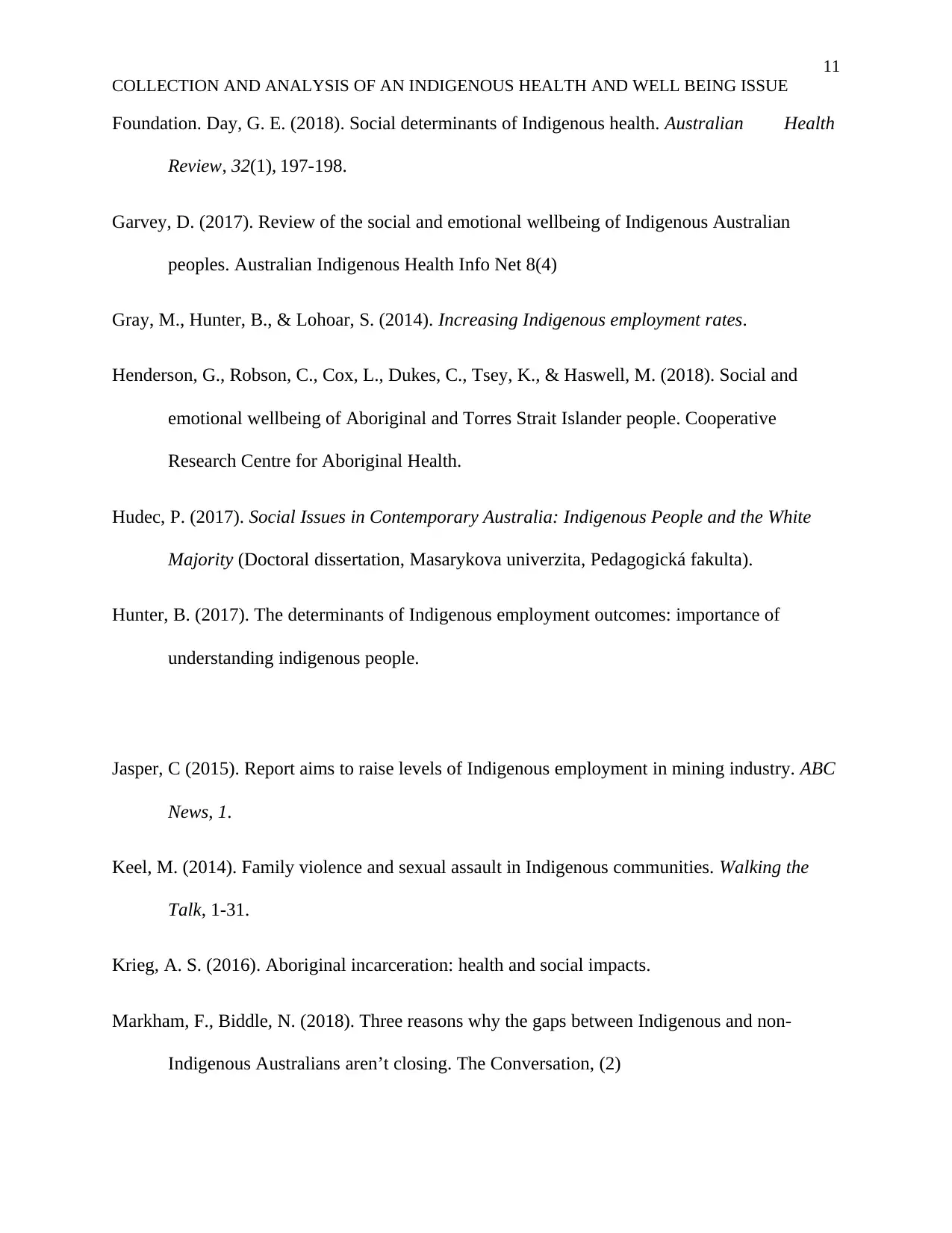
11
COLLECTION AND ANALYSIS OF AN INDIGENOUS HEALTH AND WELL BEING ISSUE
Foundation. Day, G. E. (2018). Social determinants of Indigenous health. Australian Health
Review, 32(1), 197-198.
Garvey, D. (2017). Review of the social and emotional wellbeing of Indigenous Australian
peoples. Australian Indigenous Health Info Net 8(4)
Gray, M., Hunter, B., & Lohoar, S. (2014). Increasing Indigenous employment rates.
Henderson, G., Robson, C., Cox, L., Dukes, C., Tsey, K., & Haswell, M. (2018). Social and
emotional wellbeing of Aboriginal and Torres Strait Islander people. Cooperative
Research Centre for Aboriginal Health.
Hudec, P. (2017). Social Issues in Contemporary Australia: Indigenous People and the White
Majority (Doctoral dissertation, Masarykova univerzita, Pedagogická fakulta).
Hunter, B. (2017). The determinants of Indigenous employment outcomes: importance of
understanding indigenous people.
Jasper, C (2015). Report aims to raise levels of Indigenous employment in mining industry. ABC
News, 1.
Keel, M. (2014). Family violence and sexual assault in Indigenous communities. Walking the
Talk, 1-31.
Krieg, A. S. (2016). Aboriginal incarceration: health and social impacts.
Markham, F., Biddle, N. (2018). Three reasons why the gaps between Indigenous and non-
Indigenous Australians aren’t closing. The Conversation, (2)
COLLECTION AND ANALYSIS OF AN INDIGENOUS HEALTH AND WELL BEING ISSUE
Foundation. Day, G. E. (2018). Social determinants of Indigenous health. Australian Health
Review, 32(1), 197-198.
Garvey, D. (2017). Review of the social and emotional wellbeing of Indigenous Australian
peoples. Australian Indigenous Health Info Net 8(4)
Gray, M., Hunter, B., & Lohoar, S. (2014). Increasing Indigenous employment rates.
Henderson, G., Robson, C., Cox, L., Dukes, C., Tsey, K., & Haswell, M. (2018). Social and
emotional wellbeing of Aboriginal and Torres Strait Islander people. Cooperative
Research Centre for Aboriginal Health.
Hudec, P. (2017). Social Issues in Contemporary Australia: Indigenous People and the White
Majority (Doctoral dissertation, Masarykova univerzita, Pedagogická fakulta).
Hunter, B. (2017). The determinants of Indigenous employment outcomes: importance of
understanding indigenous people.
Jasper, C (2015). Report aims to raise levels of Indigenous employment in mining industry. ABC
News, 1.
Keel, M. (2014). Family violence and sexual assault in Indigenous communities. Walking the
Talk, 1-31.
Krieg, A. S. (2016). Aboriginal incarceration: health and social impacts.
Markham, F., Biddle, N. (2018). Three reasons why the gaps between Indigenous and non-
Indigenous Australians aren’t closing. The Conversation, (2)

12
COLLECTION AND ANALYSIS OF AN INDIGENOUS HEALTH AND WELL BEING ISSUE
Marmot, M., Allen, J., Bell, R., Bloomer, E., & Goldblatt, P. (2016). WHO European review of
social determinants of health and the health divide. The Lancet, 380(9846), 1011-1029.
McCoy, B. F. (2009). Social Determinants of Indigenous Health. The Australian Journal of
Anthropology, 20(2), 262-264.
Morteza Abdollahi, M. D., Mahasti Alizadeh, M. D., Nik, S. A., Shahnam Arshi, M. D.,
Mehrdad Askarian, M. D., Bazargan-Hejazi, S., ... & Habil, H. (2018). Social
Determinants of health.
Nakari, T. (2018). Disadvantage, trauma causing high rates of Indigenous family violence. NITV
News.
Rangan, H., & Lane, M. B. (2016) Social determinants of health. OUP Oxford.
Rangan, H., & Lane, M. B. (2014). Indigenous peoples and forest management: Comparative
analysis of institutional approaches in Australia and India. Society & Natural Resources,
14(2), 145 160.Shaw, D. (2018). Social determinants of health. Clinical Medicine, 8(2),
225-226.
Stavenhagen, R. (2014). Report of the Special Rapporteur on the situation of human rights and
fundamental freedoms of indigenous people. Engaging the UN special rapporteur on
indigenous people: Opportunities and challenges. Baguio City, Philippines:
TEBTEBBA Foundation. Carson, B., Dunbar, T., Chenhall, R. D., & Bailie, R. (2017).
Social determinants of Indigenous health. Allen & Unwin.
Tallis, D. (2017). Social determinants of indigenous health.
COLLECTION AND ANALYSIS OF AN INDIGENOUS HEALTH AND WELL BEING ISSUE
Marmot, M., Allen, J., Bell, R., Bloomer, E., & Goldblatt, P. (2016). WHO European review of
social determinants of health and the health divide. The Lancet, 380(9846), 1011-1029.
McCoy, B. F. (2009). Social Determinants of Indigenous Health. The Australian Journal of
Anthropology, 20(2), 262-264.
Morteza Abdollahi, M. D., Mahasti Alizadeh, M. D., Nik, S. A., Shahnam Arshi, M. D.,
Mehrdad Askarian, M. D., Bazargan-Hejazi, S., ... & Habil, H. (2018). Social
Determinants of health.
Nakari, T. (2018). Disadvantage, trauma causing high rates of Indigenous family violence. NITV
News.
Rangan, H., & Lane, M. B. (2016) Social determinants of health. OUP Oxford.
Rangan, H., & Lane, M. B. (2014). Indigenous peoples and forest management: Comparative
analysis of institutional approaches in Australia and India. Society & Natural Resources,
14(2), 145 160.Shaw, D. (2018). Social determinants of health. Clinical Medicine, 8(2),
225-226.
Stavenhagen, R. (2014). Report of the Special Rapporteur on the situation of human rights and
fundamental freedoms of indigenous people. Engaging the UN special rapporteur on
indigenous people: Opportunities and challenges. Baguio City, Philippines:
TEBTEBBA Foundation. Carson, B., Dunbar, T., Chenhall, R. D., & Bailie, R. (2017).
Social determinants of Indigenous health. Allen & Unwin.
Tallis, D. (2017). Social determinants of indigenous health.
⊘ This is a preview!⊘
Do you want full access?
Subscribe today to unlock all pages.

Trusted by 1+ million students worldwide
1 out of 13
Related Documents
Your All-in-One AI-Powered Toolkit for Academic Success.
+13062052269
info@desklib.com
Available 24*7 on WhatsApp / Email
![[object Object]](/_next/static/media/star-bottom.7253800d.svg)
Unlock your academic potential
Copyright © 2020–2026 A2Z Services. All Rights Reserved. Developed and managed by ZUCOL.





